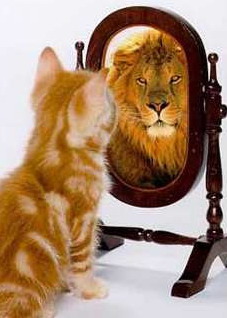How is self-esteem not deadly Pride?

It's so easy to see faults in other people.. I am very good at it!
I have heard so many times hearsay information that schools take building self-esteem in their students as a serious mission.
I understand thet low self-esteem can be a problem for a very few, but I think perhaps we have gone overboard.
One of the things I am sure of is that Pride, and what culture today calls self-esteem, deserves its place among the 7 Deadly Sins. It is pervasive and deep. Mea Culpa.
Mainly Pride distorts reality, severely damages our relationships to God and people. In fact it is a lie from the grand-daddy of lies.
In my long-time-ago schooling, there was no such thing. Self-esteem came from accomplishment. Low self-esteem was common and deserved and appropriate.
The new workers I get to see in my profession are loaded with self-esteem. I think it comes from the schools they have recently escaped from. Needless to say these kids are in for a shock as they hit reality. But it is not something they easily see. In all but one case, they have quit and looked for more accommodating pastures before confronting the root cause of their poor performance.
I also suspect this self-esteem engenders and reinforces the Victim mentality the world is awash in. Obviously, if hardly anything bad that happens to a person is that person's fault, something or someone else must be the cause. Folks with high self-esteem have a hard time seeing that it's they that are part of the problem.
Anyway, here’s an article that I have found to be very informative. I think it indicates that self-esteem and Pride delay, and perhaps prevents, people from ever seeing reality as clearly as they might.
I bring it up here in a Catholic context regarding Pride, but also because of my lingering fear of lay leaders in the Church. Especially at the Parish Council level. Everyone has something to say, and is eagar to vote! It is not a pretty scene.
Knowing one’s betters is a handy tool. Hardly popular, but it permits learning and correct action. It’s a wonderful source of Humility, Pride’s antidote. As you might expect.. also hardly popular.
The 4 predictions that the study explores:
Prediction 1.
Incompetent individuals, compared with their
more competent peers, will dramatically overestimate their ability
and performance relative to objective criteria.
Prediction 2.
Incompetent individuals will suffer from deficient
metacognitive skills, in that they will be less able than their more
competent peers to recognize competence when they see it—be it
their own or anyone else's.
Prediction 3.
Incompetent individuals will be less able than their
more competent peers to gain insight into their true level of
performance by means of social comparison information. In particular,
because of their difficulty recognizing competence in others,
incompetent individuals will be unable to use information
about the choices and performances of others to form more accurate
impressions of their own ability.
Prediction 4.
The incompetent can gain insight about their
shortcomings, but this comes (paradoxically) by making them
more competent, thus providing them the metacognitive skills
necessary to be able to realize that they have performed poorly.




0 Comments:
Post a Comment
<< Home